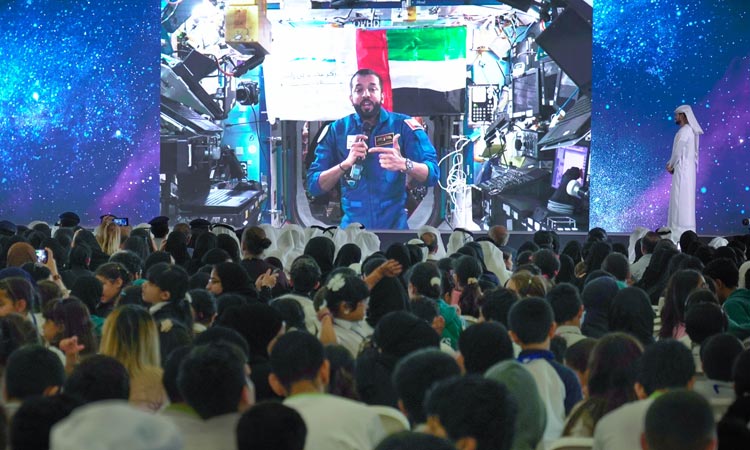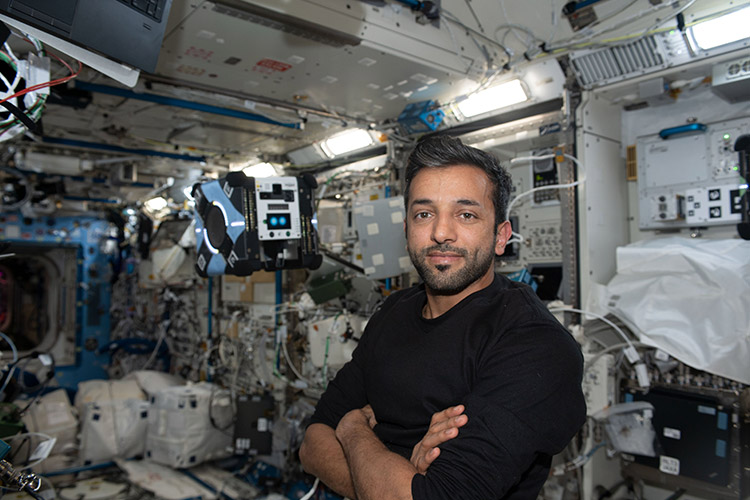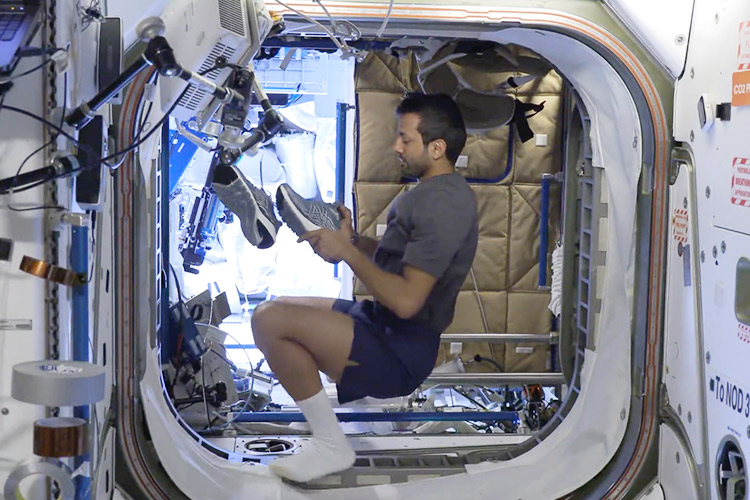Neyadi tests impact of space conditions on the heart, BP

Neyadi takes part in the Cardiobreath study.
Gulf Today, Staff Reporter
The Mohammed Bin Rashid Space Centre (MBRSC) shared a glimpse into astronaut Sultan Al Neyadi’s contribution to the Cardiobreath experiment on the International Space Station (ISS) The experiment is a critical analysis of the impact of microgravity on cardiovascular and respiratory functions and was conducted in collaboration with the Canadian Space Agency (CSA), Simon Fraser University, and The University of North Dakota.
Through the experiment, astronauts aboard the ISS monitor their heart rate, blood pressure, blood oxygen level, and ECG using a bio-monitor shirt, developed for the CSA. The study aims to observe changes in how astronauts' cardiovascular and respiratory systems control blood pressure, with the purpose of ensuring that the crew stays healthy on their way back into space.
The experiment was conducted in two phases wherein it was first tested via a custom-fitted Bio-monitor device and a stationary bike with a cycle that Al Neyadi trained on for 25 minutes at a specific level. The data from the same was tracked by researchers who monitored the heart rate, blood pressure, breathing rate, and activity levels on both the cycle and while he was standing still to measure balance. In the second stage, Sultan wore the custom-fitted Bio-Monitor shirt and monitored these measurements for the same parameters while using the Cycle Ergometer and while floating in the ISS.
Both the results will further be compared by the researchers on Earth to determine various countermeasures for cardiorespiratory risks in space. Talking further about the experiment, Adnan Al Rais, Mission Manager, UAE Astronaut Programme, said, “The Cardiobreath study is critical to our understanding of long-term space travel and how different activities impact the crew aboard the ISS. This partnership with CSA and the North Dakota and Simon Fraser universities has fortified our knowledge of the dynamics of cardiovascular and respiratory functions in space and how the body adapts to microgravity.
We are looking forward to studying this further as it contributes to the future of safer space travel.” The Cardiobreath study will support astronauts in investigating cardiovascular and respiratory systems and how they impact blood pressure. The study will also showcase the deconditioning that weightlessness can cause while shedding light on the comparison of data between male and female astronauts.
The UAE Astronaut Programme is one of the projects managed by MBRSC under the UAE’s National Space Programme and funded by the ICT Fund of the Telecommunications and Digital Government Regulatory Authority (TDRA), which aims to support research and development in the ICT sector in the UAE and promote the country’s integration on the global stage. For more information log on to "https://www.asc-csa.gc.ca/eng/sciences/cardiobreath.asp"
About Mohammed Bin Rashid Space Centre:
MBRSC is an advanced scientific and technological hub, responsible for making the UAE a world leader in space services and exploration.
Established in 2006, the Mohammad Bin Rashid Space Centre (MBRSC) started out with five engineers, who took it upon themselves to develop their capabilities and expand their knowledge in the field of space, relying on strong will and solid determination. Since then, the centre has continued its journey to be the incubator of the “UAE National Space Programme”. The MBRSC has undertaken the tasks of building, developing, and operating a number of Earth observation satellites, providing imaging services, analysing and studying them, as well as producing relevant data to scientific communities and research centres around the world.
Among the satellites that the centre operates are DubaiSat-1 & DubaiSat-2. The MBRSC is also responsible for KhalifaSat, celebrated as the first satellite that was fully built by Emiratis in 2018. Recently, the centre revealed its plan to develop the new satellite MBZ-SAT, which is expected to be launched at the end of 2023 and to be the latest in the field of high-resolution imaging from outer space.







